Critical Analysis: Risk Management in Ghana's Offshore Oil Sector
VerifiedAdded on 2020/07/22
|10
|2766
|33
Report
AI Summary
This dissertation proposal critically examines risk management practices in Ghana's offshore oil operations. The study delves into the inherent risks, including health and safety, political, and economic factors, that impact the industry. It aims to analyze current trends, identify threats, evaluate existing risk management strategies, and recommend improvements for Ghanaian offshore oil companies. The literature review covers risk and risk management theories, alongside inherent risk factors and practices within the offshore oil sector. The methodology outlines an interpretivism paradigm with a qualitative, inductive approach, utilizing secondary data sources and thematic analysis. Ethical considerations are addressed to ensure data integrity and avoid bias. The scope focuses on the Ghanaian offshore oil sector's contribution to the economy, encompassing various risk types and management approaches. The significance of the study lies in providing valuable information for oil companies, regulatory bodies, and future researchers, offering insights to minimize threats and enhance the long-term sustainability of the industry.
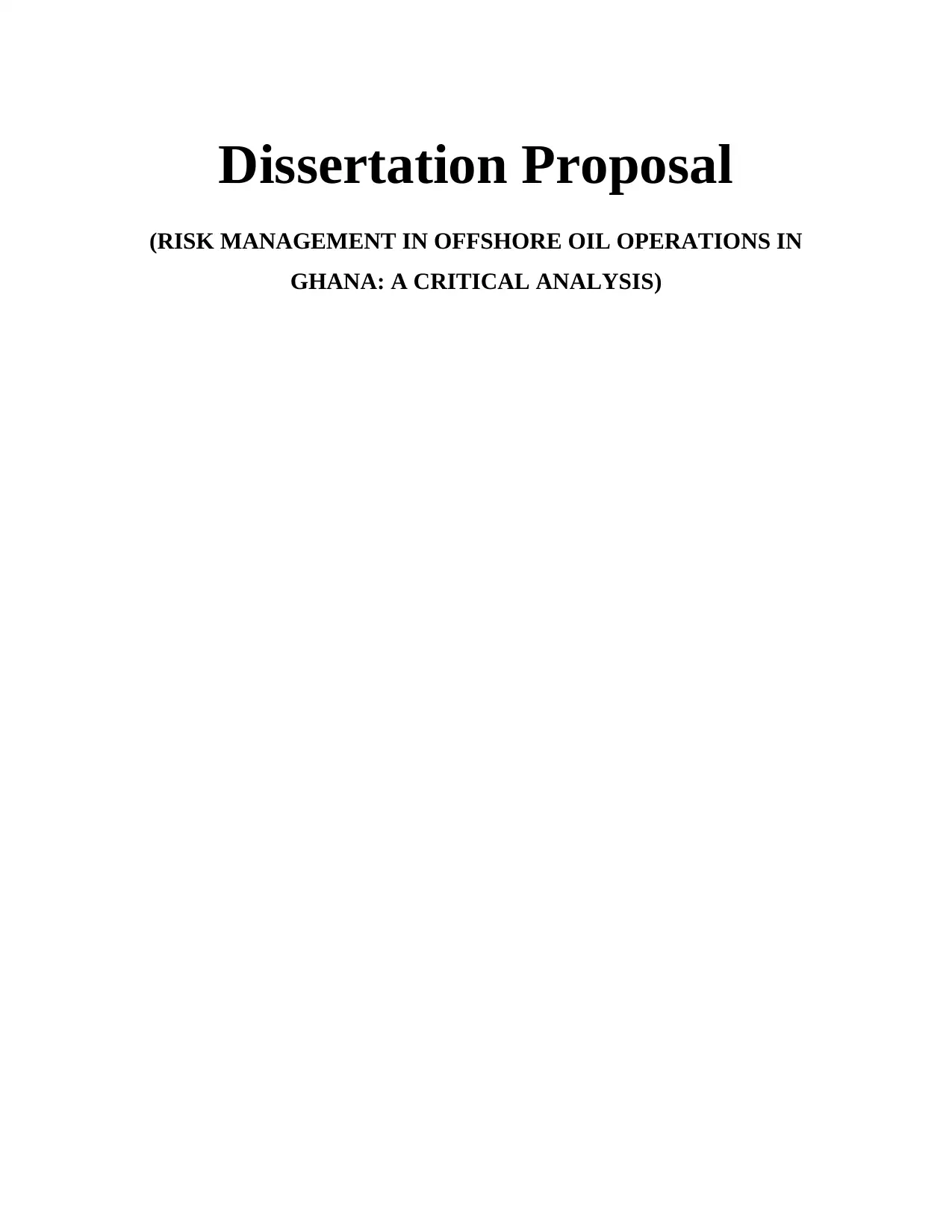
Dissertation Proposal
(RISK MANAGEMENT IN OFFSHORE OIL OPERATIONS IN
GHANA: A CRITICAL ANALYSIS)
(RISK MANAGEMENT IN OFFSHORE OIL OPERATIONS IN
GHANA: A CRITICAL ANALYSIS)
Paraphrase This Document
Need a fresh take? Get an instant paraphrase of this document with our AI Paraphraser
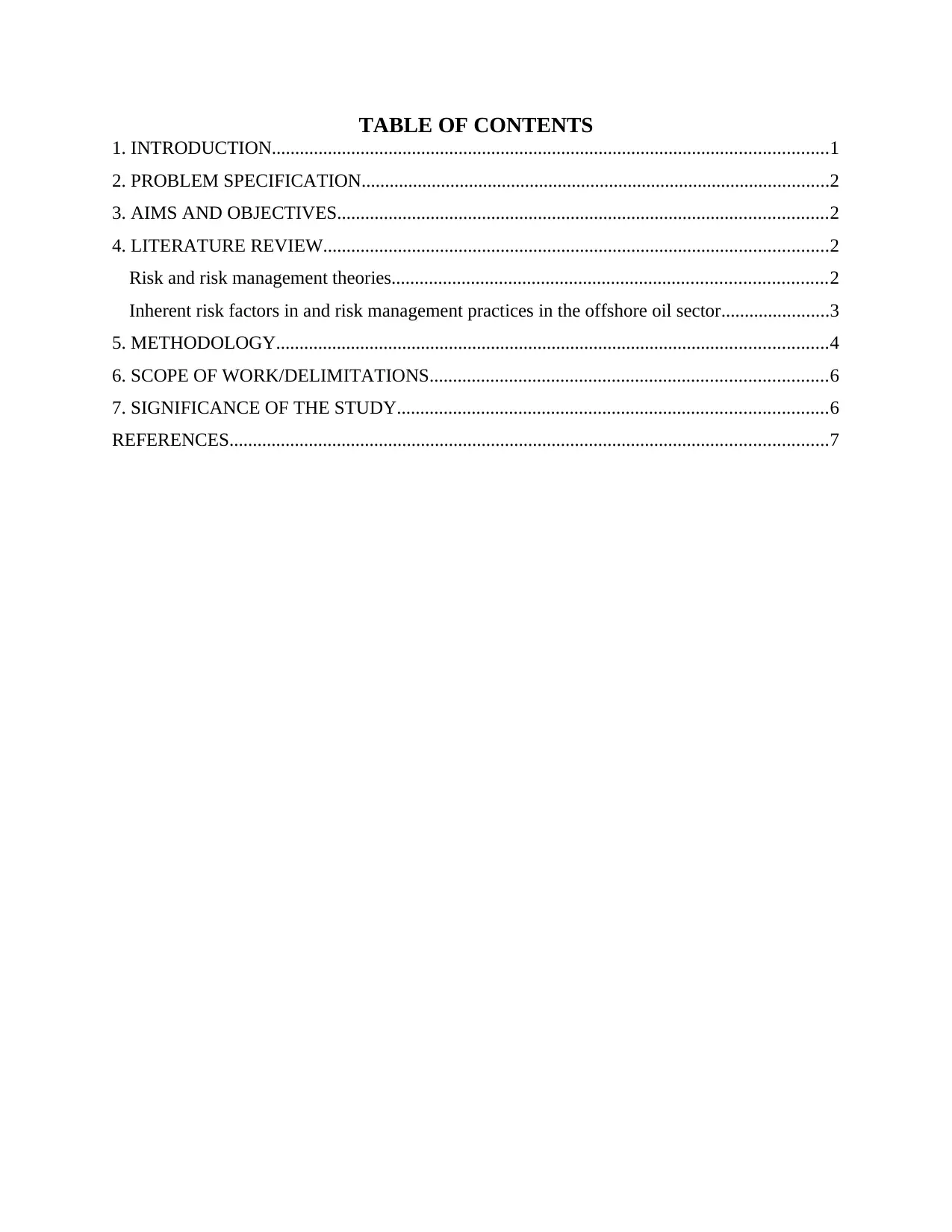
TABLE OF CONTENTS
1. INTRODUCTION.......................................................................................................................1
2. PROBLEM SPECIFICATION....................................................................................................2
3. AIMS AND OBJECTIVES.........................................................................................................2
4. LITERATURE REVIEW............................................................................................................2
Risk and risk management theories.............................................................................................2
Inherent risk factors in and risk management practices in the offshore oil sector.......................3
5. METHODOLOGY......................................................................................................................4
6. SCOPE OF WORK/DELIMITATIONS.....................................................................................6
7. SIGNIFICANCE OF THE STUDY............................................................................................6
REFERENCES................................................................................................................................7
1. INTRODUCTION.......................................................................................................................1
2. PROBLEM SPECIFICATION....................................................................................................2
3. AIMS AND OBJECTIVES.........................................................................................................2
4. LITERATURE REVIEW............................................................................................................2
Risk and risk management theories.............................................................................................2
Inherent risk factors in and risk management practices in the offshore oil sector.......................3
5. METHODOLOGY......................................................................................................................4
6. SCOPE OF WORK/DELIMITATIONS.....................................................................................6
7. SIGNIFICANCE OF THE STUDY............................................................................................6
REFERENCES................................................................................................................................7
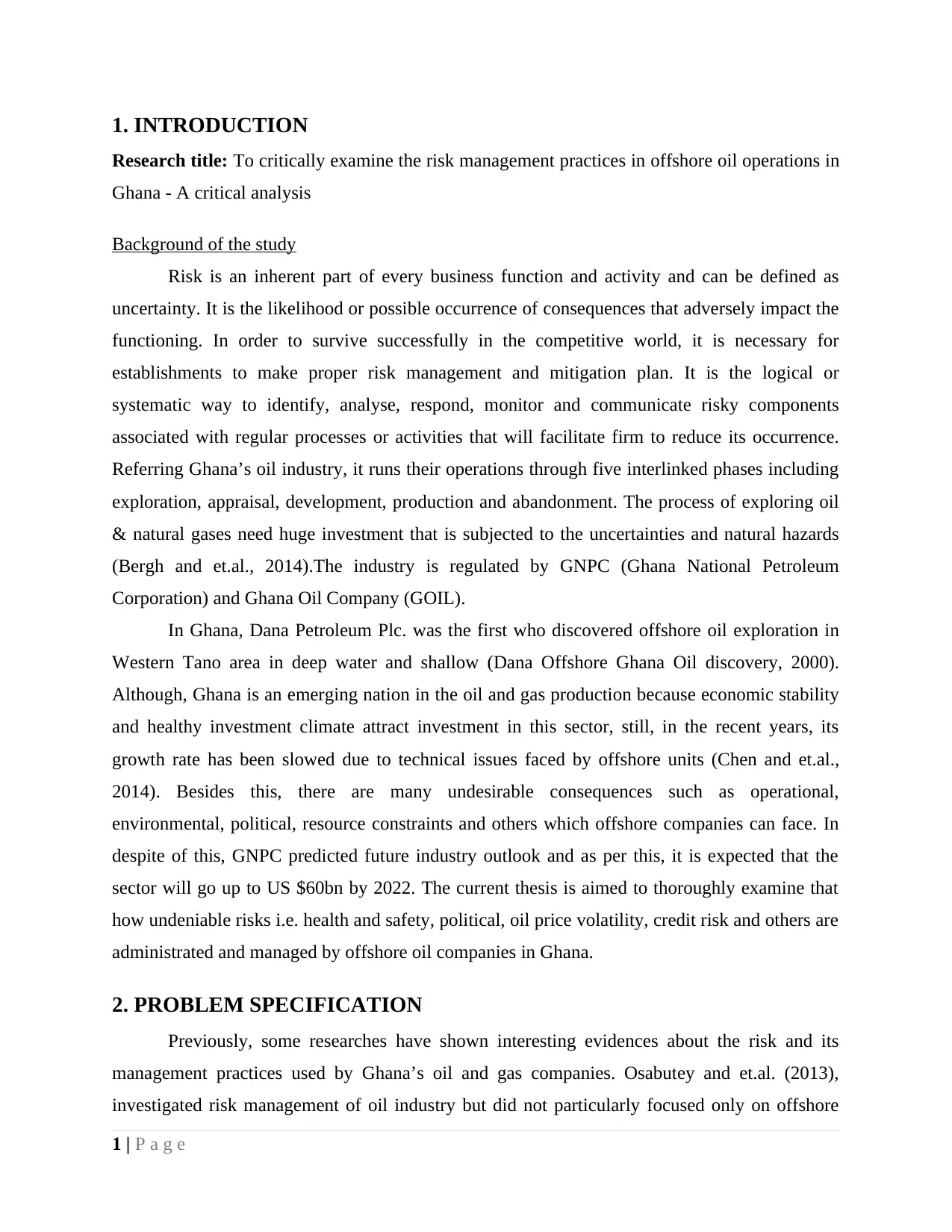
1. INTRODUCTION
Research title: To critically examine the risk management practices in offshore oil operations in
Ghana - A critical analysis
Background of the study
Risk is an inherent part of every business function and activity and can be defined as
uncertainty. It is the likelihood or possible occurrence of consequences that adversely impact the
functioning. In order to survive successfully in the competitive world, it is necessary for
establishments to make proper risk management and mitigation plan. It is the logical or
systematic way to identify, analyse, respond, monitor and communicate risky components
associated with regular processes or activities that will facilitate firm to reduce its occurrence.
Referring Ghana’s oil industry, it runs their operations through five interlinked phases including
exploration, appraisal, development, production and abandonment. The process of exploring oil
& natural gases need huge investment that is subjected to the uncertainties and natural hazards
(Bergh and et.al., 2014).The industry is regulated by GNPC (Ghana National Petroleum
Corporation) and Ghana Oil Company (GOIL).
In Ghana, Dana Petroleum Plc. was the first who discovered offshore oil exploration in
Western Tano area in deep water and shallow (Dana Offshore Ghana Oil discovery, 2000).
Although, Ghana is an emerging nation in the oil and gas production because economic stability
and healthy investment climate attract investment in this sector, still, in the recent years, its
growth rate has been slowed due to technical issues faced by offshore units (Chen and et.al.,
2014). Besides this, there are many undesirable consequences such as operational,
environmental, political, resource constraints and others which offshore companies can face. In
despite of this, GNPC predicted future industry outlook and as per this, it is expected that the
sector will go up to US $60bn by 2022. The current thesis is aimed to thoroughly examine that
how undeniable risks i.e. health and safety, political, oil price volatility, credit risk and others are
administrated and managed by offshore oil companies in Ghana.
2. PROBLEM SPECIFICATION
Previously, some researches have shown interesting evidences about the risk and its
management practices used by Ghana’s oil and gas companies. Osabutey and et.al. (2013),
investigated risk management of oil industry but did not particularly focused only on offshore
1 | P a g e
Research title: To critically examine the risk management practices in offshore oil operations in
Ghana - A critical analysis
Background of the study
Risk is an inherent part of every business function and activity and can be defined as
uncertainty. It is the likelihood or possible occurrence of consequences that adversely impact the
functioning. In order to survive successfully in the competitive world, it is necessary for
establishments to make proper risk management and mitigation plan. It is the logical or
systematic way to identify, analyse, respond, monitor and communicate risky components
associated with regular processes or activities that will facilitate firm to reduce its occurrence.
Referring Ghana’s oil industry, it runs their operations through five interlinked phases including
exploration, appraisal, development, production and abandonment. The process of exploring oil
& natural gases need huge investment that is subjected to the uncertainties and natural hazards
(Bergh and et.al., 2014).The industry is regulated by GNPC (Ghana National Petroleum
Corporation) and Ghana Oil Company (GOIL).
In Ghana, Dana Petroleum Plc. was the first who discovered offshore oil exploration in
Western Tano area in deep water and shallow (Dana Offshore Ghana Oil discovery, 2000).
Although, Ghana is an emerging nation in the oil and gas production because economic stability
and healthy investment climate attract investment in this sector, still, in the recent years, its
growth rate has been slowed due to technical issues faced by offshore units (Chen and et.al.,
2014). Besides this, there are many undesirable consequences such as operational,
environmental, political, resource constraints and others which offshore companies can face. In
despite of this, GNPC predicted future industry outlook and as per this, it is expected that the
sector will go up to US $60bn by 2022. The current thesis is aimed to thoroughly examine that
how undeniable risks i.e. health and safety, political, oil price volatility, credit risk and others are
administrated and managed by offshore oil companies in Ghana.
2. PROBLEM SPECIFICATION
Previously, some researches have shown interesting evidences about the risk and its
management practices used by Ghana’s oil and gas companies. Osabutey and et.al. (2013),
investigated risk management of oil industry but did not particularly focused only on offshore
1 | P a g e
⊘ This is a preview!⊘
Do you want full access?
Subscribe today to unlock all pages.

Trusted by 1+ million students worldwide
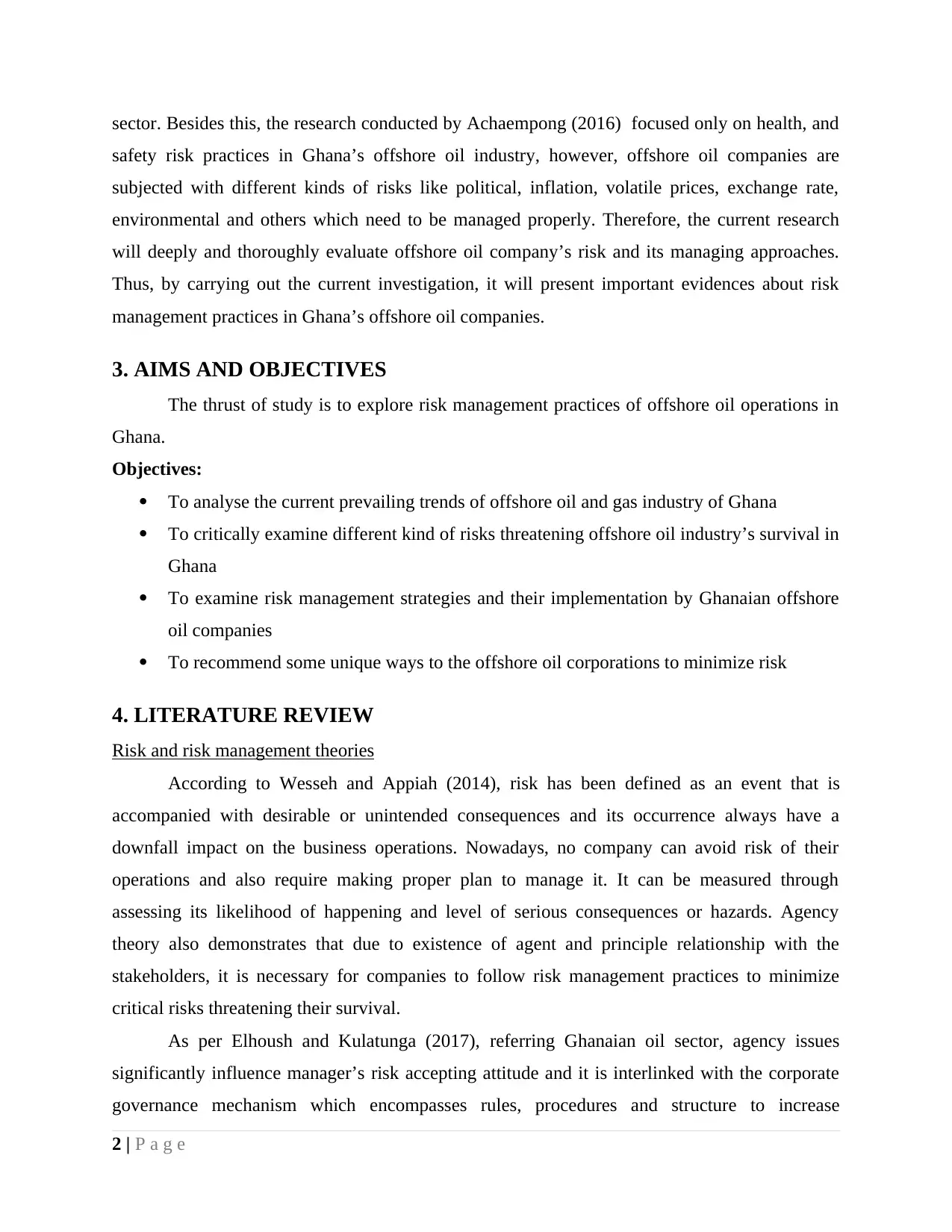
sector. Besides this, the research conducted by Achaempong (2016) focused only on health, and
safety risk practices in Ghana’s offshore oil industry, however, offshore oil companies are
subjected with different kinds of risks like political, inflation, volatile prices, exchange rate,
environmental and others which need to be managed properly. Therefore, the current research
will deeply and thoroughly evaluate offshore oil company’s risk and its managing approaches.
Thus, by carrying out the current investigation, it will present important evidences about risk
management practices in Ghana’s offshore oil companies.
3. AIMS AND OBJECTIVES
The thrust of study is to explore risk management practices of offshore oil operations in
Ghana.
Objectives:
To analyse the current prevailing trends of offshore oil and gas industry of Ghana
To critically examine different kind of risks threatening offshore oil industry’s survival in
Ghana
To examine risk management strategies and their implementation by Ghanaian offshore
oil companies
To recommend some unique ways to the offshore oil corporations to minimize risk
4. LITERATURE REVIEW
Risk and risk management theories
According to Wesseh and Appiah (2014), risk has been defined as an event that is
accompanied with desirable or unintended consequences and its occurrence always have a
downfall impact on the business operations. Nowadays, no company can avoid risk of their
operations and also require making proper plan to manage it. It can be measured through
assessing its likelihood of happening and level of serious consequences or hazards. Agency
theory also demonstrates that due to existence of agent and principle relationship with the
stakeholders, it is necessary for companies to follow risk management practices to minimize
critical risks threatening their survival.
As per Elhoush and Kulatunga (2017), referring Ghanaian oil sector, agency issues
significantly influence manager’s risk accepting attitude and it is interlinked with the corporate
governance mechanism which encompasses rules, procedures and structure to increase
2 | P a g e
safety risk practices in Ghana’s offshore oil industry, however, offshore oil companies are
subjected with different kinds of risks like political, inflation, volatile prices, exchange rate,
environmental and others which need to be managed properly. Therefore, the current research
will deeply and thoroughly evaluate offshore oil company’s risk and its managing approaches.
Thus, by carrying out the current investigation, it will present important evidences about risk
management practices in Ghana’s offshore oil companies.
3. AIMS AND OBJECTIVES
The thrust of study is to explore risk management practices of offshore oil operations in
Ghana.
Objectives:
To analyse the current prevailing trends of offshore oil and gas industry of Ghana
To critically examine different kind of risks threatening offshore oil industry’s survival in
Ghana
To examine risk management strategies and their implementation by Ghanaian offshore
oil companies
To recommend some unique ways to the offshore oil corporations to minimize risk
4. LITERATURE REVIEW
Risk and risk management theories
According to Wesseh and Appiah (2014), risk has been defined as an event that is
accompanied with desirable or unintended consequences and its occurrence always have a
downfall impact on the business operations. Nowadays, no company can avoid risk of their
operations and also require making proper plan to manage it. It can be measured through
assessing its likelihood of happening and level of serious consequences or hazards. Agency
theory also demonstrates that due to existence of agent and principle relationship with the
stakeholders, it is necessary for companies to follow risk management practices to minimize
critical risks threatening their survival.
As per Elhoush and Kulatunga (2017), referring Ghanaian oil sector, agency issues
significantly influence manager’s risk accepting attitude and it is interlinked with the corporate
governance mechanism which encompasses rules, procedures and structure to increase
2 | P a g e
Paraphrase This Document
Need a fresh take? Get an instant paraphrase of this document with our AI Paraphraser
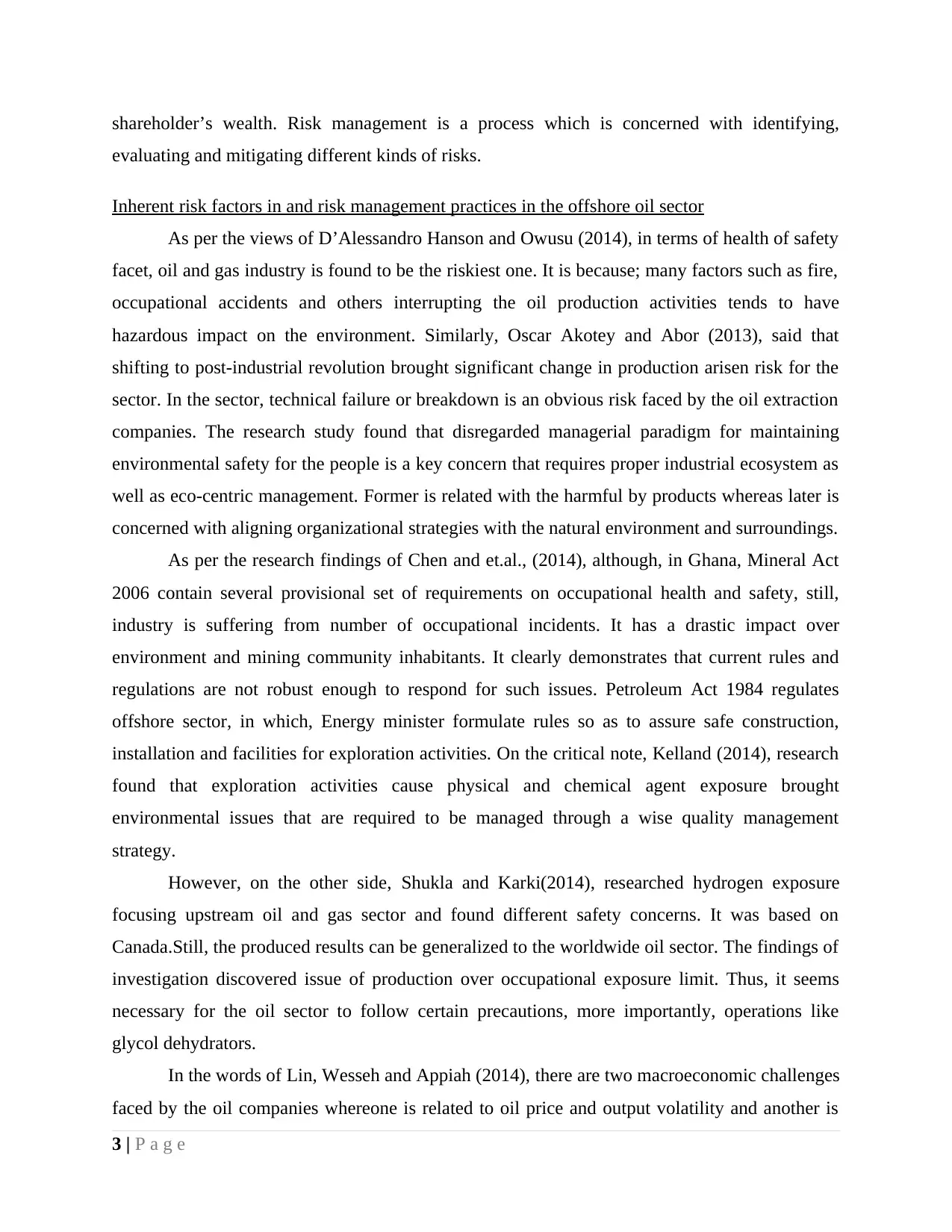
shareholder’s wealth. Risk management is a process which is concerned with identifying,
evaluating and mitigating different kinds of risks.
Inherent risk factors in and risk management practices in the offshore oil sector
As per the views of D’Alessandro Hanson and Owusu (2014), in terms of health of safety
facet, oil and gas industry is found to be the riskiest one. It is because; many factors such as fire,
occupational accidents and others interrupting the oil production activities tends to have
hazardous impact on the environment. Similarly, Oscar Akotey and Abor (2013), said that
shifting to post-industrial revolution brought significant change in production arisen risk for the
sector. In the sector, technical failure or breakdown is an obvious risk faced by the oil extraction
companies. The research study found that disregarded managerial paradigm for maintaining
environmental safety for the people is a key concern that requires proper industrial ecosystem as
well as eco-centric management. Former is related with the harmful by products whereas later is
concerned with aligning organizational strategies with the natural environment and surroundings.
As per the research findings of Chen and et.al., (2014), although, in Ghana, Mineral Act
2006 contain several provisional set of requirements on occupational health and safety, still,
industry is suffering from number of occupational incidents. It has a drastic impact over
environment and mining community inhabitants. It clearly demonstrates that current rules and
regulations are not robust enough to respond for such issues. Petroleum Act 1984 regulates
offshore sector, in which, Energy minister formulate rules so as to assure safe construction,
installation and facilities for exploration activities. On the critical note, Kelland (2014), research
found that exploration activities cause physical and chemical agent exposure brought
environmental issues that are required to be managed through a wise quality management
strategy.
However, on the other side, Shukla and Karki(2014), researched hydrogen exposure
focusing upstream oil and gas sector and found different safety concerns. It was based on
Canada.Still, the produced results can be generalized to the worldwide oil sector. The findings of
investigation discovered issue of production over occupational exposure limit. Thus, it seems
necessary for the oil sector to follow certain precautions, more importantly, operations like
glycol dehydrators.
In the words of Lin, Wesseh and Appiah (2014), there are two macroeconomic challenges
faced by the oil companies whereone is related to oil price and output volatility and another is
3 | P a g e
evaluating and mitigating different kinds of risks.
Inherent risk factors in and risk management practices in the offshore oil sector
As per the views of D’Alessandro Hanson and Owusu (2014), in terms of health of safety
facet, oil and gas industry is found to be the riskiest one. It is because; many factors such as fire,
occupational accidents and others interrupting the oil production activities tends to have
hazardous impact on the environment. Similarly, Oscar Akotey and Abor (2013), said that
shifting to post-industrial revolution brought significant change in production arisen risk for the
sector. In the sector, technical failure or breakdown is an obvious risk faced by the oil extraction
companies. The research study found that disregarded managerial paradigm for maintaining
environmental safety for the people is a key concern that requires proper industrial ecosystem as
well as eco-centric management. Former is related with the harmful by products whereas later is
concerned with aligning organizational strategies with the natural environment and surroundings.
As per the research findings of Chen and et.al., (2014), although, in Ghana, Mineral Act
2006 contain several provisional set of requirements on occupational health and safety, still,
industry is suffering from number of occupational incidents. It has a drastic impact over
environment and mining community inhabitants. It clearly demonstrates that current rules and
regulations are not robust enough to respond for such issues. Petroleum Act 1984 regulates
offshore sector, in which, Energy minister formulate rules so as to assure safe construction,
installation and facilities for exploration activities. On the critical note, Kelland (2014), research
found that exploration activities cause physical and chemical agent exposure brought
environmental issues that are required to be managed through a wise quality management
strategy.
However, on the other side, Shukla and Karki(2014), researched hydrogen exposure
focusing upstream oil and gas sector and found different safety concerns. It was based on
Canada.Still, the produced results can be generalized to the worldwide oil sector. The findings of
investigation discovered issue of production over occupational exposure limit. Thus, it seems
necessary for the oil sector to follow certain precautions, more importantly, operations like
glycol dehydrators.
In the words of Lin, Wesseh and Appiah (2014), there are two macroeconomic challenges
faced by the oil companies whereone is related to oil price and output volatility and another is
3 | P a g e
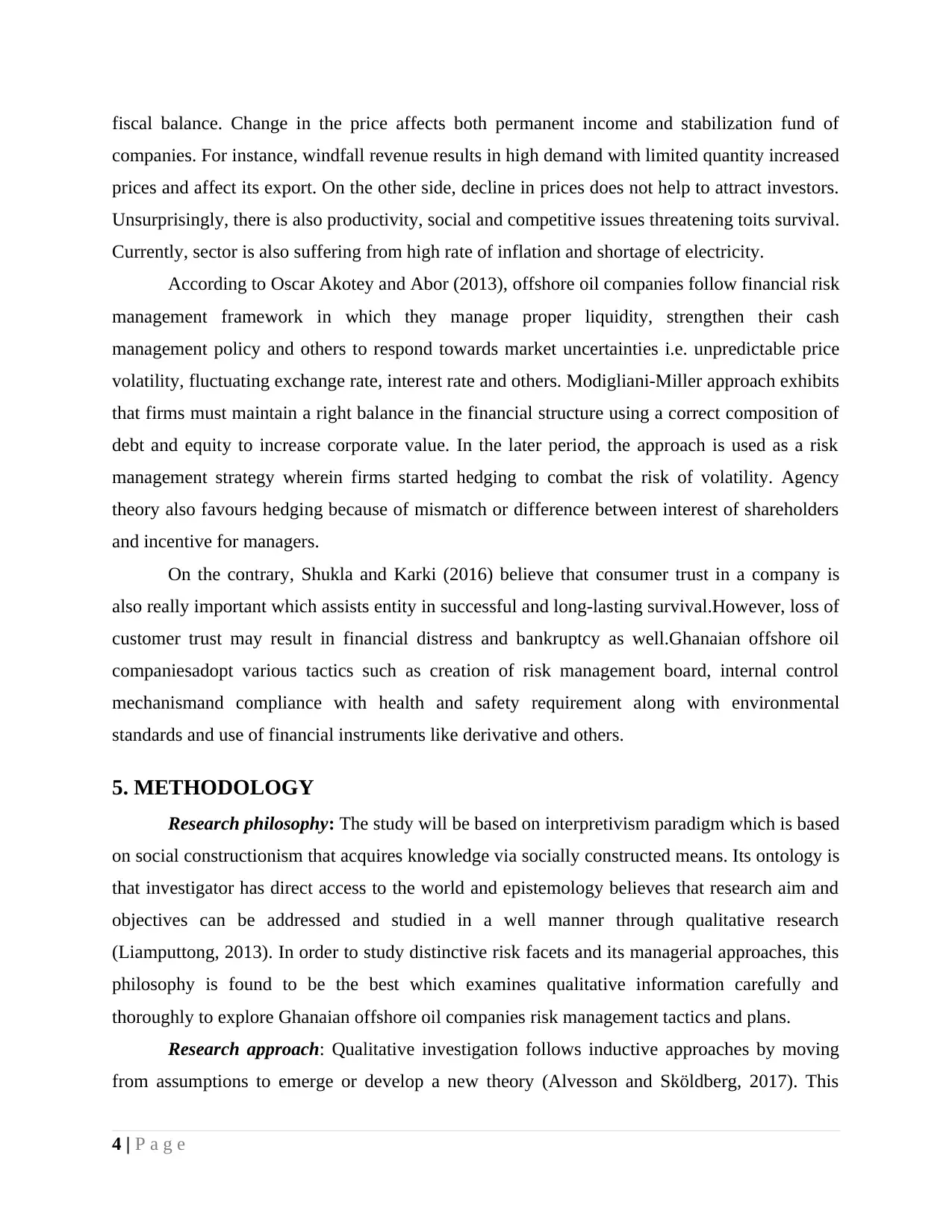
fiscal balance. Change in the price affects both permanent income and stabilization fund of
companies. For instance, windfall revenue results in high demand with limited quantity increased
prices and affect its export. On the other side, decline in prices does not help to attract investors.
Unsurprisingly, there is also productivity, social and competitive issues threatening toits survival.
Currently, sector is also suffering from high rate of inflation and shortage of electricity.
According to Oscar Akotey and Abor (2013), offshore oil companies follow financial risk
management framework in which they manage proper liquidity, strengthen their cash
management policy and others to respond towards market uncertainties i.e. unpredictable price
volatility, fluctuating exchange rate, interest rate and others. Modigliani-Miller approach exhibits
that firms must maintain a right balance in the financial structure using a correct composition of
debt and equity to increase corporate value. In the later period, the approach is used as a risk
management strategy wherein firms started hedging to combat the risk of volatility. Agency
theory also favours hedging because of mismatch or difference between interest of shareholders
and incentive for managers.
On the contrary, Shukla and Karki (2016) believe that consumer trust in a company is
also really important which assists entity in successful and long-lasting survival.However, loss of
customer trust may result in financial distress and bankruptcy as well.Ghanaian offshore oil
companiesadopt various tactics such as creation of risk management board, internal control
mechanismand compliance with health and safety requirement along with environmental
standards and use of financial instruments like derivative and others.
5. METHODOLOGY
Research philosophy: The study will be based on interpretivism paradigm which is based
on social constructionism that acquires knowledge via socially constructed means. Its ontology is
that investigator has direct access to the world and epistemology believes that research aim and
objectives can be addressed and studied in a well manner through qualitative research
(Liamputtong, 2013). In order to study distinctive risk facets and its managerial approaches, this
philosophy is found to be the best which examines qualitative information carefully and
thoroughly to explore Ghanaian offshore oil companies risk management tactics and plans.
Research approach: Qualitative investigation follows inductive approaches by moving
from assumptions to emerge or develop a new theory (Alvesson and Sköldberg, 2017). This
4 | P a g e
companies. For instance, windfall revenue results in high demand with limited quantity increased
prices and affect its export. On the other side, decline in prices does not help to attract investors.
Unsurprisingly, there is also productivity, social and competitive issues threatening toits survival.
Currently, sector is also suffering from high rate of inflation and shortage of electricity.
According to Oscar Akotey and Abor (2013), offshore oil companies follow financial risk
management framework in which they manage proper liquidity, strengthen their cash
management policy and others to respond towards market uncertainties i.e. unpredictable price
volatility, fluctuating exchange rate, interest rate and others. Modigliani-Miller approach exhibits
that firms must maintain a right balance in the financial structure using a correct composition of
debt and equity to increase corporate value. In the later period, the approach is used as a risk
management strategy wherein firms started hedging to combat the risk of volatility. Agency
theory also favours hedging because of mismatch or difference between interest of shareholders
and incentive for managers.
On the contrary, Shukla and Karki (2016) believe that consumer trust in a company is
also really important which assists entity in successful and long-lasting survival.However, loss of
customer trust may result in financial distress and bankruptcy as well.Ghanaian offshore oil
companiesadopt various tactics such as creation of risk management board, internal control
mechanismand compliance with health and safety requirement along with environmental
standards and use of financial instruments like derivative and others.
5. METHODOLOGY
Research philosophy: The study will be based on interpretivism paradigm which is based
on social constructionism that acquires knowledge via socially constructed means. Its ontology is
that investigator has direct access to the world and epistemology believes that research aim and
objectives can be addressed and studied in a well manner through qualitative research
(Liamputtong, 2013). In order to study distinctive risk facets and its managerial approaches, this
philosophy is found to be the best which examines qualitative information carefully and
thoroughly to explore Ghanaian offshore oil companies risk management tactics and plans.
Research approach: Qualitative investigation follows inductive approaches by moving
from assumptions to emerge or develop a new theory (Alvesson and Sköldberg, 2017). This
4 | P a g e
⊘ This is a preview!⊘
Do you want full access?
Subscribe today to unlock all pages.

Trusted by 1+ million students worldwide
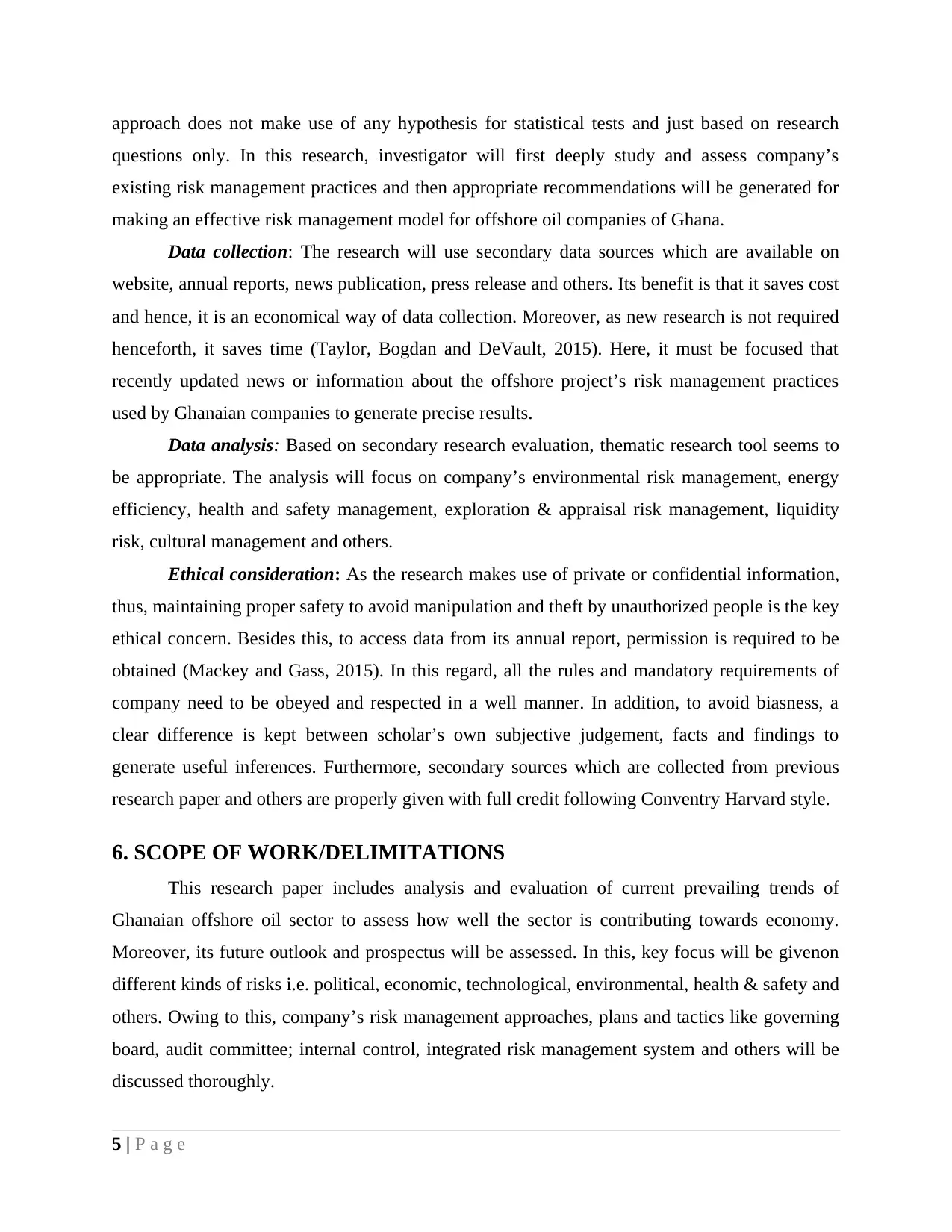
approach does not make use of any hypothesis for statistical tests and just based on research
questions only. In this research, investigator will first deeply study and assess company’s
existing risk management practices and then appropriate recommendations will be generated for
making an effective risk management model for offshore oil companies of Ghana.
Data collection: The research will use secondary data sources which are available on
website, annual reports, news publication, press release and others. Its benefit is that it saves cost
and hence, it is an economical way of data collection. Moreover, as new research is not required
henceforth, it saves time (Taylor, Bogdan and DeVault, 2015). Here, it must be focused that
recently updated news or information about the offshore project’s risk management practices
used by Ghanaian companies to generate precise results.
Data analysis: Based on secondary research evaluation, thematic research tool seems to
be appropriate. The analysis will focus on company’s environmental risk management, energy
efficiency, health and safety management, exploration & appraisal risk management, liquidity
risk, cultural management and others.
Ethical consideration: As the research makes use of private or confidential information,
thus, maintaining proper safety to avoid manipulation and theft by unauthorized people is the key
ethical concern. Besides this, to access data from its annual report, permission is required to be
obtained (Mackey and Gass, 2015). In this regard, all the rules and mandatory requirements of
company need to be obeyed and respected in a well manner. In addition, to avoid biasness, a
clear difference is kept between scholar’s own subjective judgement, facts and findings to
generate useful inferences. Furthermore, secondary sources which are collected from previous
research paper and others are properly given with full credit following Conventry Harvard style.
6. SCOPE OF WORK/DELIMITATIONS
This research paper includes analysis and evaluation of current prevailing trends of
Ghanaian offshore oil sector to assess how well the sector is contributing towards economy.
Moreover, its future outlook and prospectus will be assessed. In this, key focus will be givenon
different kinds of risks i.e. political, economic, technological, environmental, health & safety and
others. Owing to this, company’s risk management approaches, plans and tactics like governing
board, audit committee; internal control, integrated risk management system and others will be
discussed thoroughly.
5 | P a g e
questions only. In this research, investigator will first deeply study and assess company’s
existing risk management practices and then appropriate recommendations will be generated for
making an effective risk management model for offshore oil companies of Ghana.
Data collection: The research will use secondary data sources which are available on
website, annual reports, news publication, press release and others. Its benefit is that it saves cost
and hence, it is an economical way of data collection. Moreover, as new research is not required
henceforth, it saves time (Taylor, Bogdan and DeVault, 2015). Here, it must be focused that
recently updated news or information about the offshore project’s risk management practices
used by Ghanaian companies to generate precise results.
Data analysis: Based on secondary research evaluation, thematic research tool seems to
be appropriate. The analysis will focus on company’s environmental risk management, energy
efficiency, health and safety management, exploration & appraisal risk management, liquidity
risk, cultural management and others.
Ethical consideration: As the research makes use of private or confidential information,
thus, maintaining proper safety to avoid manipulation and theft by unauthorized people is the key
ethical concern. Besides this, to access data from its annual report, permission is required to be
obtained (Mackey and Gass, 2015). In this regard, all the rules and mandatory requirements of
company need to be obeyed and respected in a well manner. In addition, to avoid biasness, a
clear difference is kept between scholar’s own subjective judgement, facts and findings to
generate useful inferences. Furthermore, secondary sources which are collected from previous
research paper and others are properly given with full credit following Conventry Harvard style.
6. SCOPE OF WORK/DELIMITATIONS
This research paper includes analysis and evaluation of current prevailing trends of
Ghanaian offshore oil sector to assess how well the sector is contributing towards economy.
Moreover, its future outlook and prospectus will be assessed. In this, key focus will be givenon
different kinds of risks i.e. political, economic, technological, environmental, health & safety and
others. Owing to this, company’s risk management approaches, plans and tactics like governing
board, audit committee; internal control, integrated risk management system and others will be
discussed thoroughly.
5 | P a g e
Paraphrase This Document
Need a fresh take? Get an instant paraphrase of this document with our AI Paraphraser
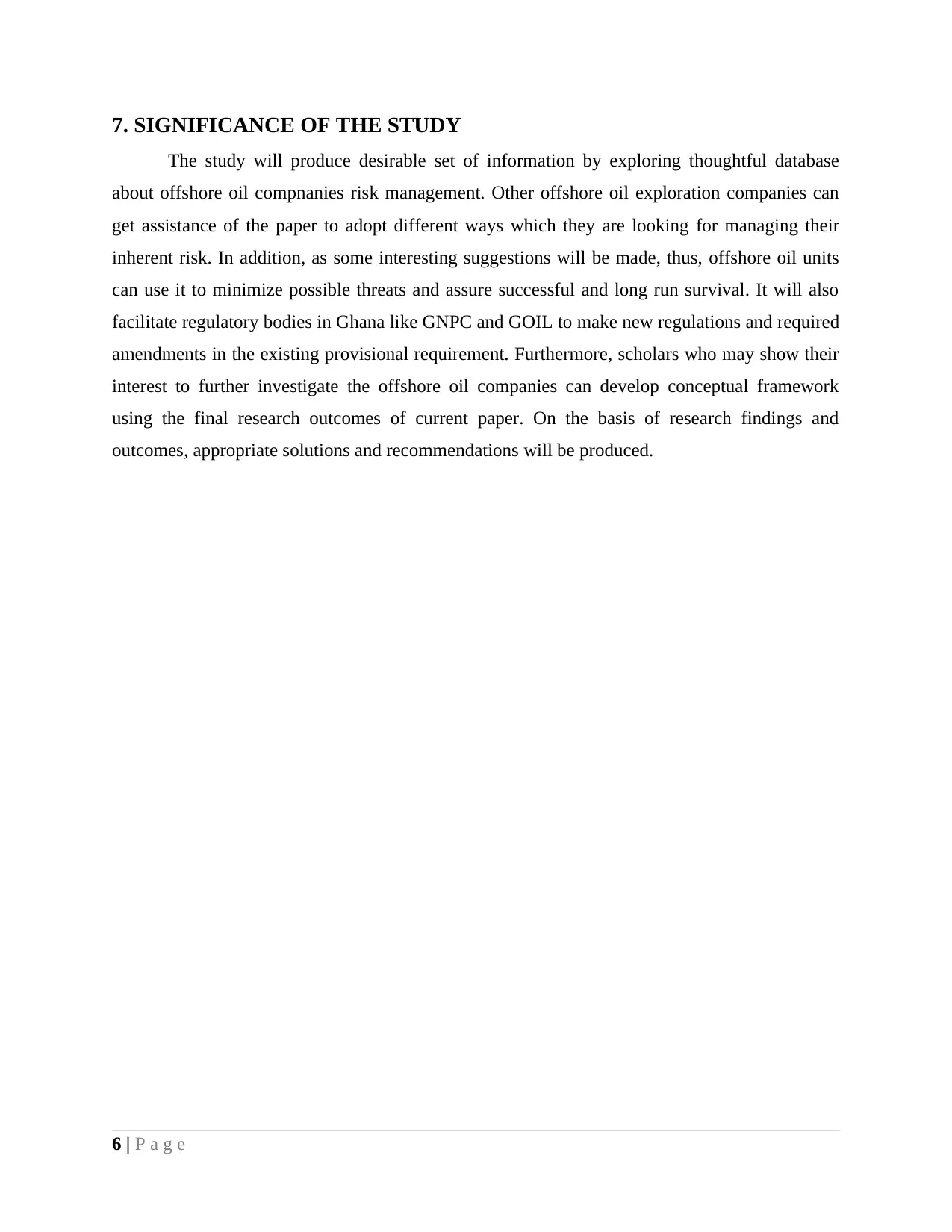
7. SIGNIFICANCE OF THE STUDY
The study will produce desirable set of information by exploring thoughtful database
about offshore oil compnanies risk management. Other offshore oil exploration companies can
get assistance of the paper to adopt different ways which they are looking for managing their
inherent risk. In addition, as some interesting suggestions will be made, thus, offshore oil units
can use it to minimize possible threats and assure successful and long run survival. It will also
facilitate regulatory bodies in Ghana like GNPC and GOIL to make new regulations and required
amendments in the existing provisional requirement. Furthermore, scholars who may show their
interest to further investigate the offshore oil companies can develop conceptual framework
using the final research outcomes of current paper. On the basis of research findings and
outcomes, appropriate solutions and recommendations will be produced.
6 | P a g e
The study will produce desirable set of information by exploring thoughtful database
about offshore oil compnanies risk management. Other offshore oil exploration companies can
get assistance of the paper to adopt different ways which they are looking for managing their
inherent risk. In addition, as some interesting suggestions will be made, thus, offshore oil units
can use it to minimize possible threats and assure successful and long run survival. It will also
facilitate regulatory bodies in Ghana like GNPC and GOIL to make new regulations and required
amendments in the existing provisional requirement. Furthermore, scholars who may show their
interest to further investigate the offshore oil companies can develop conceptual framework
using the final research outcomes of current paper. On the basis of research findings and
outcomes, appropriate solutions and recommendations will be produced.
6 | P a g e
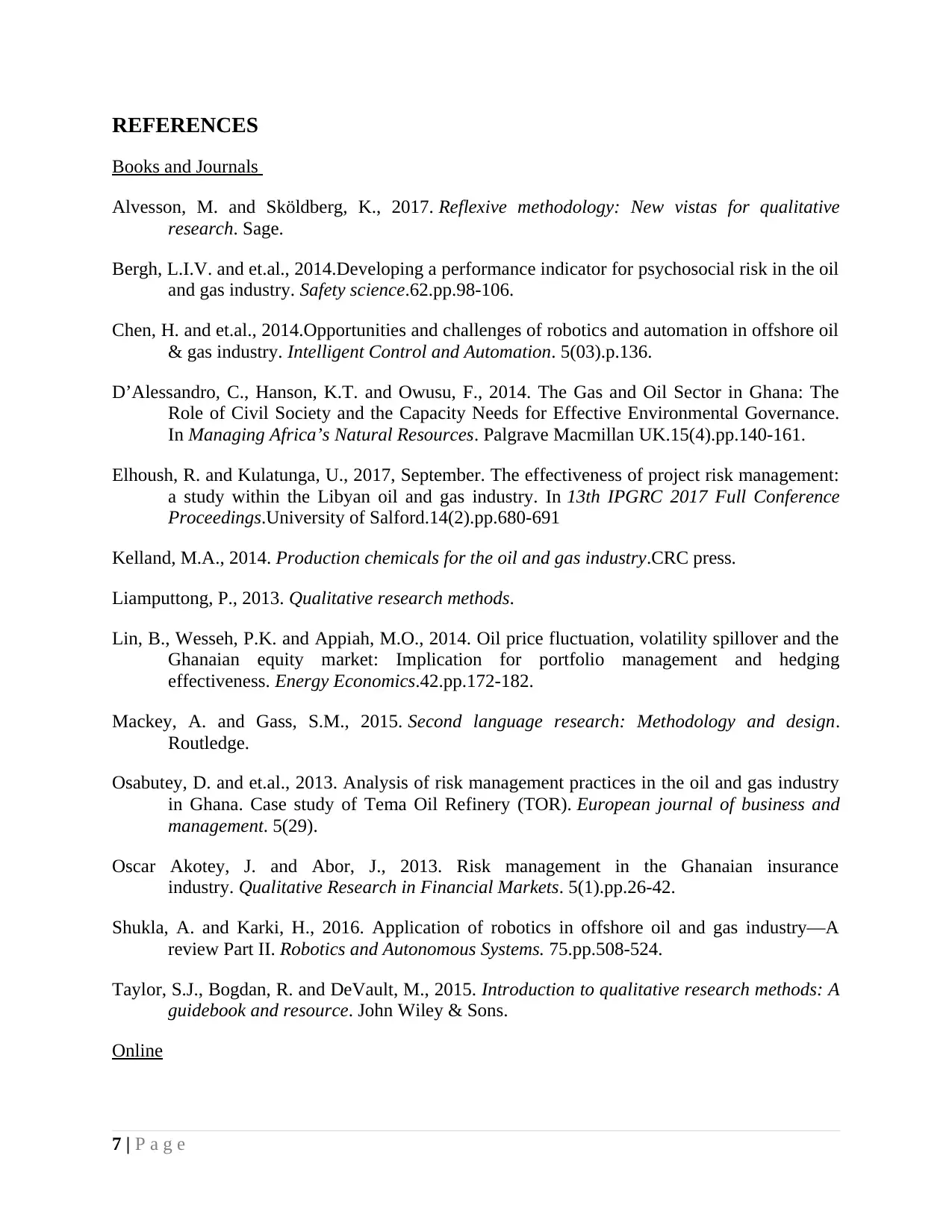
REFERENCES
Books and Journals
Alvesson, M. and Sköldberg, K., 2017. Reflexive methodology: New vistas for qualitative
research. Sage.
Bergh, L.I.V. and et.al., 2014.Developing a performance indicator for psychosocial risk in the oil
and gas industry. Safety science.62.pp.98-106.
Chen, H. and et.al., 2014.Opportunities and challenges of robotics and automation in offshore oil
& gas industry. Intelligent Control and Automation. 5(03).p.136.
D’Alessandro, C., Hanson, K.T. and Owusu, F., 2014. The Gas and Oil Sector in Ghana: The
Role of Civil Society and the Capacity Needs for Effective Environmental Governance.
In Managing Africa’s Natural Resources. Palgrave Macmillan UK.15(4).pp.140-161.
Elhoush, R. and Kulatunga, U., 2017, September. The effectiveness of project risk management:
a study within the Libyan oil and gas industry. In 13th IPGRC 2017 Full Conference
Proceedings.University of Salford.14(2).pp.680-691
Kelland, M.A., 2014. Production chemicals for the oil and gas industry.CRC press.
Liamputtong, P., 2013. Qualitative research methods.
Lin, B., Wesseh, P.K. and Appiah, M.O., 2014. Oil price fluctuation, volatility spillover and the
Ghanaian equity market: Implication for portfolio management and hedging
effectiveness. Energy Economics.42.pp.172-182.
Mackey, A. and Gass, S.M., 2015. Second language research: Methodology and design.
Routledge.
Osabutey, D. and et.al., 2013. Analysis of risk management practices in the oil and gas industry
in Ghana. Case study of Tema Oil Refinery (TOR). European journal of business and
management. 5(29).
Oscar Akotey, J. and Abor, J., 2013. Risk management in the Ghanaian insurance
industry. Qualitative Research in Financial Markets. 5(1).pp.26-42.
Shukla, A. and Karki, H., 2016. Application of robotics in offshore oil and gas industry—A
review Part II. Robotics and Autonomous Systems. 75.pp.508-524.
Taylor, S.J., Bogdan, R. and DeVault, M., 2015. Introduction to qualitative research methods: A
guidebook and resource. John Wiley & Sons.
Online
7 | P a g e
Books and Journals
Alvesson, M. and Sköldberg, K., 2017. Reflexive methodology: New vistas for qualitative
research. Sage.
Bergh, L.I.V. and et.al., 2014.Developing a performance indicator for psychosocial risk in the oil
and gas industry. Safety science.62.pp.98-106.
Chen, H. and et.al., 2014.Opportunities and challenges of robotics and automation in offshore oil
& gas industry. Intelligent Control and Automation. 5(03).p.136.
D’Alessandro, C., Hanson, K.T. and Owusu, F., 2014. The Gas and Oil Sector in Ghana: The
Role of Civil Society and the Capacity Needs for Effective Environmental Governance.
In Managing Africa’s Natural Resources. Palgrave Macmillan UK.15(4).pp.140-161.
Elhoush, R. and Kulatunga, U., 2017, September. The effectiveness of project risk management:
a study within the Libyan oil and gas industry. In 13th IPGRC 2017 Full Conference
Proceedings.University of Salford.14(2).pp.680-691
Kelland, M.A., 2014. Production chemicals for the oil and gas industry.CRC press.
Liamputtong, P., 2013. Qualitative research methods.
Lin, B., Wesseh, P.K. and Appiah, M.O., 2014. Oil price fluctuation, volatility spillover and the
Ghanaian equity market: Implication for portfolio management and hedging
effectiveness. Energy Economics.42.pp.172-182.
Mackey, A. and Gass, S.M., 2015. Second language research: Methodology and design.
Routledge.
Osabutey, D. and et.al., 2013. Analysis of risk management practices in the oil and gas industry
in Ghana. Case study of Tema Oil Refinery (TOR). European journal of business and
management. 5(29).
Oscar Akotey, J. and Abor, J., 2013. Risk management in the Ghanaian insurance
industry. Qualitative Research in Financial Markets. 5(1).pp.26-42.
Shukla, A. and Karki, H., 2016. Application of robotics in offshore oil and gas industry—A
review Part II. Robotics and Autonomous Systems. 75.pp.508-524.
Taylor, S.J., Bogdan, R. and DeVault, M., 2015. Introduction to qualitative research methods: A
guidebook and resource. John Wiley & Sons.
Online
7 | P a g e
⊘ This is a preview!⊘
Do you want full access?
Subscribe today to unlock all pages.

Trusted by 1+ million students worldwide
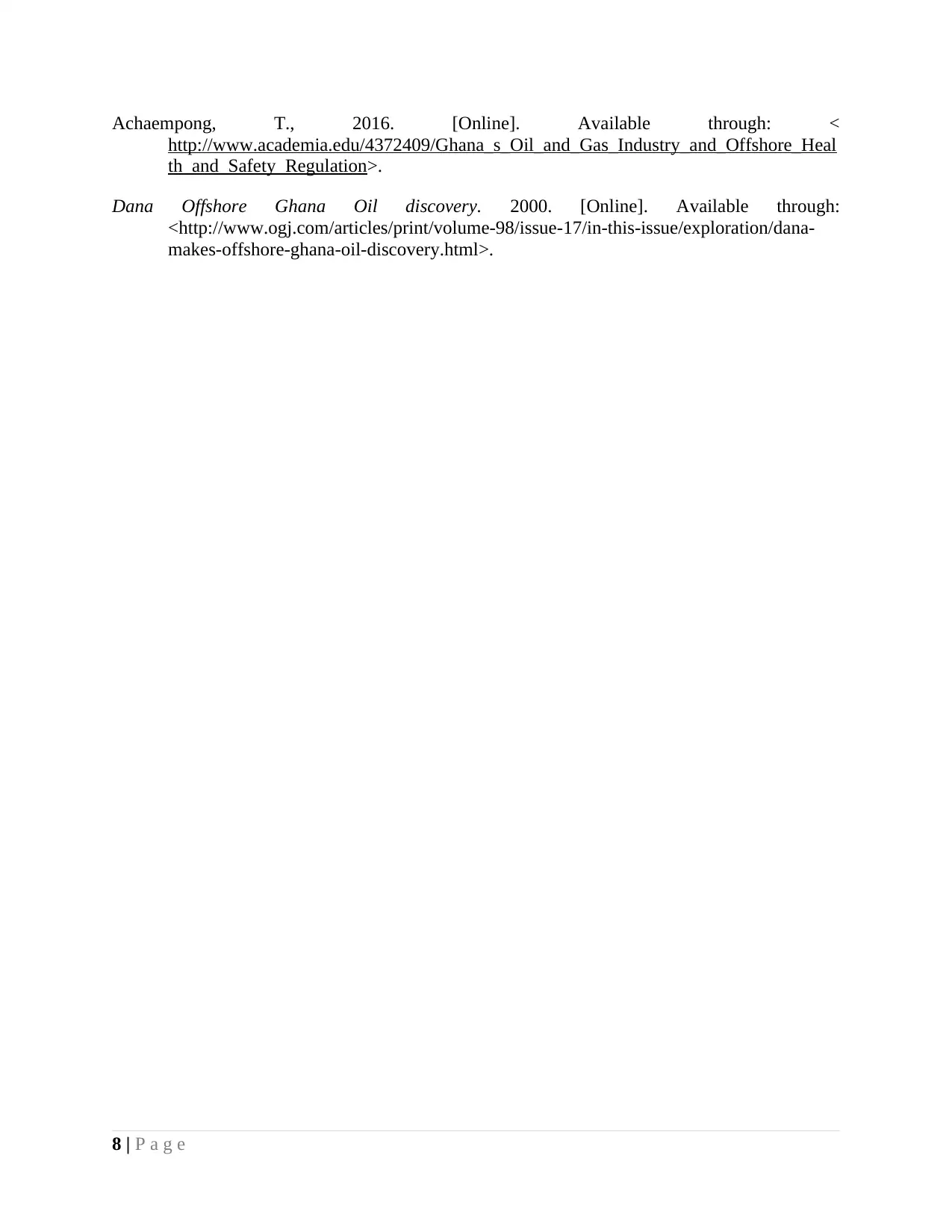
Achaempong, T., 2016. [Online]. Available through: <
http://www.academia.edu/4372409/Ghana_s_Oil_and_Gas_Industry_and_Offshore_Heal
th_and_Safety_Regulation>.
Dana Offshore Ghana Oil discovery. 2000. [Online]. Available through:
<http://www.ogj.com/articles/print/volume-98/issue-17/in-this-issue/exploration/dana-
makes-offshore-ghana-oil-discovery.html>.
8 | P a g e
http://www.academia.edu/4372409/Ghana_s_Oil_and_Gas_Industry_and_Offshore_Heal
th_and_Safety_Regulation>.
Dana Offshore Ghana Oil discovery. 2000. [Online]. Available through:
<http://www.ogj.com/articles/print/volume-98/issue-17/in-this-issue/exploration/dana-
makes-offshore-ghana-oil-discovery.html>.
8 | P a g e
1 out of 10
Related Documents
Your All-in-One AI-Powered Toolkit for Academic Success.
+13062052269
info@desklib.com
Available 24*7 on WhatsApp / Email
![[object Object]](/_next/static/media/star-bottom.7253800d.svg)
Unlock your academic potential
Copyright © 2020–2025 A2Z Services. All Rights Reserved. Developed and managed by ZUCOL.




